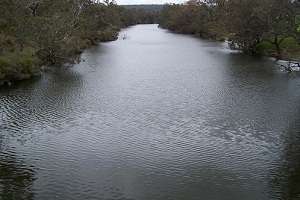Groundwater proves key to sustaining south-west fish

Murdoch University scientists have emphasised the importance of groundwater in maintaining freshwater fish, as part of a recent study.
Murdoch Freshwater Fish Group & Fish Health Unit experts Dr Stephen Beatty, Dr David Morgan and Dr Alan Lymbery collaborated on the paper, "Implications of climate change for potamodromous fishes" published in Climate Change Biology.
Dr Beatty says there has previously been more than 1500 papers in the literature on climate change impacts on freshwater fish.
"But most of those [papers] are looking at the Northern Hemisphere, and species that are diadromous [move in and out of rivers and the ocean as part of their lifecycle]," he says.
"Only a few studies look at the impacts on potamodromous fish [that only move within river systems as part of their life cycle], and none look at the impact of rainfall reduction, and therefore river-flow reduction, on the lifecycles of these fish.
"So it's a bit of a global first."
The team studied fish migrations in the main channel of the Blackwood River and the tributaries that flow into it, including the perennial Milyeannup Brook which is maintained by the Yarragadee Groundwater Aquifer.
The team first investigated the movements of target species and modelled those movements against a list of environmental variables in order to understand which of those variables could most explain the strength of spawning migration of the fish.
"We collected that data using directional netting, about 1300 individuals nets over four years, which is a huge amount of work," Dr Beatty says.
"We then looked at life history stages, where larvae downstream movement of juveniles were occurring; prior to this we didn't have much of an idea."
However, the team found the amount of discharge out of the tributaries was, by far, the best predictor of upstream and downstream spawning migrations of most of the small fresh water fish in the system.
Dr Beatty describes the south-west of WA as a "global 'pinup' of the drying temperate environment".
According to the paper, since the mid-1970s, a decline in the region's annual rainfall has resulted in severe reductions in surface flows.
"So it's critical to make sure that the refuge habitat of these fish are not impacted anymore than climate change already will impact them," Dr Beatty says.
"In terms of taking action, we need to ensure there is a fair allocation of freshwater for the environment, and that includes both surface water, and groundwater abstractions."
More information: "Implications of climate change for potamodromous fishes." Glob Chang Biol. 2013 Oct 19. DOI: 10.1111/gcb.12444. [Epub ahead of print]. Beatty SJ, Morgan DL, Lymbery AJ.
Provided by Science Network WA


















